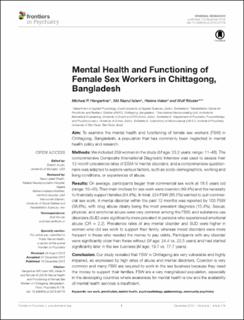Please use this identifier to cite or link to this item:
https://doi.org/10.21256/zhaw-1586Full metadata record
| DC Field | Value | Language |
|---|---|---|
| dc.contributor.author | Hengartner, Michael Pascal | - |
| dc.contributor.author | Islam, Md Nazrul | - |
| dc.contributor.author | Haker, Helene | - |
| dc.contributor.author | Rössler, Wulf | - |
| dc.date.accessioned | 2018-01-30T13:41:39Z | - |
| dc.date.available | 2018-01-30T13:41:39Z | - |
| dc.date.issued | 2015-12-15 | - |
| dc.identifier.issn | 1664-0640 | de_CH |
| dc.identifier.uri | https://digitalcollection.zhaw.ch/handle/11475/2283 | - |
| dc.description.abstract | Aim: To examine the mental health and functioning of female sex workers (FSW) in Chittagong, Bangladesh, a population that has commonly been neglected in mental health policy and research. Methods: We included 259 women in the study (M age: 23.2 years; range: 11-48). The comprehensive Composite International Diagnostic Interview was used to assess their 12-month prevalence rates of DSM-IV mental disorders, and a comprehensive questionnaire was adapted to explore various factors, such as socio-demographics, working and living conditions, or experiences of abuse. Results: On average, participants began their commercial sex work at 18.5 years old (range: 10–45). Their main motives for sex work were coercion (49.4%) and the necessity to financially support families (54.8%). In total, 224 FSW (86.5%) wanted to quit commercial sex work. A mental disorder within the past 12 months was reported by 100 FSW (38.6%), with drug abuse clearly being the most prevalent diagnosis (15.4%). Sexual, physical, and emotional abuse were very common among the FSW, and substance use disorders (SUD) were significantly more prevalent in persons who experienced emotional abuse (OR = 2.2). Prevalence rates of any mental disorder and SUD were higher in women who did sex work to support their family, whereas mood disorders were more frequent in those who needed the money to pay debts. Participants with any disorder were significantly older than those without (M age: 24.4 vs. 22.5 years) and had started significantly later in the sex business (M age: 19.7 vs. 17.7 years). Conclusion: Our study revealed that FSW in Chittagong are very vulnerable and highly impaired, as expressed by high rates of abuse and mental disorders. Coercion is very common and many FSW are required to work in the sex business because they need the money to support their families. FSW are a very marginalized population, especially in the developing countries where awareness for mental health is low and the availability of mental health services is insufficient. | de_CH |
| dc.language.iso | en | de_CH |
| dc.publisher | Frontiers Research Foundation | de_CH |
| dc.relation.ispartof | Frontiers in Psychiatry | de_CH |
| dc.rights | http://creativecommons.org/licenses/by/4.0/ | de_CH |
| dc.subject | Sex work | de_CH |
| dc.subject | Prostitution | de_CH |
| dc.subject | Mental health | de_CH |
| dc.subject | Psychopathology | de_CH |
| dc.subject | Epidemiology | de_CH |
| dc.subject | Community psychiatry | de_CH |
| dc.subject.ddc | 306: Kultur | de_CH |
| dc.subject.ddc | 616.8: Neurologie und Krankheiten des Nervensystems | de_CH |
| dc.title | Mental health and functioning of female sex workers in Chittagong, Bangladesh | de_CH |
| dc.type | Beitrag in wissenschaftlicher Zeitschrift | de_CH |
| dcterms.type | Text | de_CH |
| zhaw.departement | Angewandte Psychologie | de_CH |
| zhaw.organisationalunit | Psychologisches Institut (PI) | de_CH |
| dc.identifier.doi | 10.21256/zhaw-1586 | - |
| dc.identifier.doi | 10.3389/fpsyt.2015.00176 | de_CH |
| zhaw.funding.eu | No | de_CH |
| zhaw.issue | 176 | de_CH |
| zhaw.originated.zhaw | Yes | de_CH |
| zhaw.publication.status | publishedVersion | de_CH |
| zhaw.volume | 6 | de_CH |
| zhaw.publication.review | Peer review (Publikation) | de_CH |
| zhaw.webfeed | Klinische Psychologie | de_CH |
| Appears in collections: | Publikationen Angewandte Psychologie | |
Files in This Item:
| File | Description | Size | Format | |
|---|---|---|---|---|
| 2015_Hengartner_Mental health and functioning of female sex workers_Frontiers in Psychiatry.pdf | 294.04 kB | Adobe PDF |  View/Open |
Show simple item record
Hengartner, M. P., Islam, M. N., Haker, H., & Rössler, W. (2015). Mental health and functioning of female sex workers in Chittagong, Bangladesh. Frontiers in Psychiatry, 6(176). https://doi.org/10.21256/zhaw-1586
Hengartner, M.P. et al. (2015) ‘Mental health and functioning of female sex workers in Chittagong, Bangladesh’, Frontiers in Psychiatry, 6(176). Available at: https://doi.org/10.21256/zhaw-1586.
M. P. Hengartner, M. N. Islam, H. Haker, and W. Rössler, “Mental health and functioning of female sex workers in Chittagong, Bangladesh,” Frontiers in Psychiatry, vol. 6, no. 176, Dec. 2015, doi: 10.21256/zhaw-1586.
HENGARTNER, Michael Pascal, Md Nazrul ISLAM, Helene HAKER und Wulf RÖSSLER, 2015. Mental health and functioning of female sex workers in Chittagong, Bangladesh. Frontiers in Psychiatry. 15 Dezember 2015. Bd. 6, Nr. 176. DOI 10.21256/zhaw-1586
Hengartner, Michael Pascal, Md Nazrul Islam, Helene Haker, and Wulf Rössler. 2015. “Mental Health and Functioning of Female Sex Workers in Chittagong, Bangladesh.” Frontiers in Psychiatry 6 (176). https://doi.org/10.21256/zhaw-1586.
Hengartner, Michael Pascal, et al. “Mental Health and Functioning of Female Sex Workers in Chittagong, Bangladesh.” Frontiers in Psychiatry, vol. 6, no. 176, Dec. 2015, https://doi.org/10.21256/zhaw-1586.
Items in DSpace are protected by copyright, with all rights reserved, unless otherwise indicated.